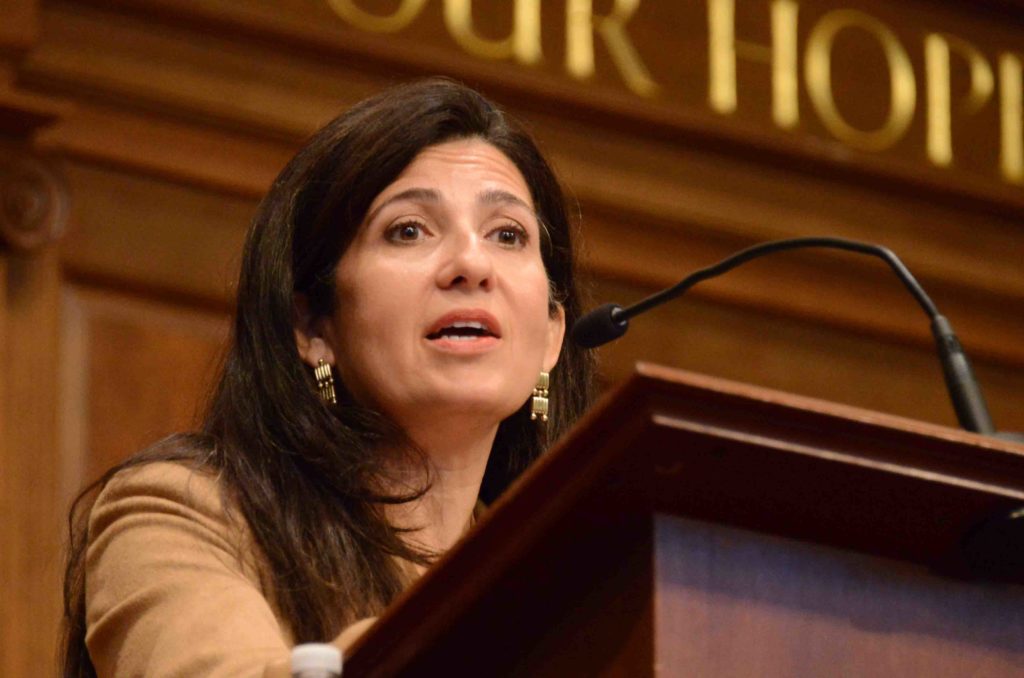Mahsa Khanbabai on Immigration, Past and Present
“Every day, all around the world, people are moving,” began Mahsa Khanbabai in Hall on October 4. “They’re making the most difficult decisions of their lives: to leave behind their families, their friends, everything they’ve known, for a better life, or a safer life. Each of them do it for different reasons—maybe for a student visa, or a work visa, for family, or because they’re seeking refuge.”
Ms. Khanbabai is an immigration attorney who has dedicated her legal career to immigration and naturalization issues, assisting clients with employment visas, family petitions, and citizenship applications. A member of the American Immigration Lawyers Association for more than 20 years, Ms. Khanbabai is a director of the Association’s Board of Governors; she was also appointed co-chair of the Association’s Afghan Response Taskforce in 2021, to help oversee the many legal issues that arose as a result of the crisis in Afghanistan.
Ms. Khanbabai was the first speaker in the year’s Hall series on immigration—the topic of which is the focus for RL’s annual Founder’s Day program this November. In Hall, Ms. Khanbabai walked students through the definitions of the terms migrant, refugee, asylum seeker, and parolee. She explained some of the critical issues related to immigration today—the humanitarian, legal, and climate crisis realities that accompany migrants. She described an anonymous group of individuals who came to America over a ten-year period, fleeing extreme poverty and starvation, driven by panic and desperation, dressed in rags. Her description underscored the point that this group could have been the Irish in the 1850s, or immigrants from South America in 2021. Their circumstances and their stories are, at their core, the same. Ms. Khanbabai also described how Congress’s increasing the numbers of work visas available to immigrants in the United States would help to address the troubling labor shortage of doctors, nurses, farmers, and hospitality and manufacturing professionals that has come into sharper focus since the pandemic.
“The United States has the ability to again be a welcoming country, for people seeking to move here for humanitarian reasons. I was walking the Freedom Trail with a friend over the weekend, and I came across a quotation from Benjamin Franklin who said, ‘Experience keeps a dear school, but fools will learn in no other.’ Basically he was saying that we should not repeat mistakes that were made throughout history—in vilifying immigrants, whether it’s the Irish, the Afghans, or Central Americans. Our own rich history as a country was built upon the backs of hard-working immigrants, so I hope that you have a chance to explore your own family’s immigration history, and to be a catalyst for positive change in our immigration laws.”
Ms. Khanbabai frequently lectures on issues involving immigrants and the immigration process, and she is regularly interviewed by news agencies such as NPR, the Wall Street Journal, The New York Times, and MSNBC. She earned her bachelor’s degree in political science at Union College and her law degree at Albany Law School. She serves on the board of several organizations, and previously served on the Massachusetts Governor’s Advisory Council on Refugees and Immigrants. Born in Iran and raised in Western Massachusetts, Ms. Khanbabai is a first generation immigrant whose father was a J-1 physician. In addition to her native language of English, she speaks Farsi and conversational Turkish.
On Founder’s Day in early November, the school will hear from author and historian Stephen Puleo, who will discuss Boston’s North End and its rich culture of immigrant communities over time. Because the topic of immigration is immense and multi-faceted, a broader understanding of the topic benefits each of us. Thus, we will hear throughout the year from a series of speakers who have made immigration—the study of it, the support of it, and the experience of it—their life’s work.

